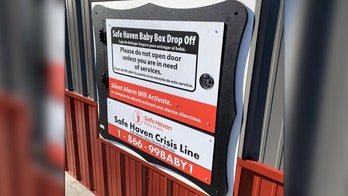
In this Monday, June 25, 2012 file photo, during a fact-finding tour of Vashon High School, U.S. Secretary of Education Arne Duncan, center, listens to eighth-grade students Delvion Mitchell, 14, and Makayla Lewis, 14, as they discuss social issues they have encountered at school and what they have learned from them, in St. Louis. (AP)
SEATTLE – The U.S. Department of Education is announcing that two more states have won their bid to be relieved of some requirements of the federal "No Child Left Behind" Law.
Washington and Wisconsin are joining 24 other states that have earned waivers from the federal education law. Washington state education officials confirmed their state's waiver. The Wisconsin waiver was reported by The New York Times.
The department's formal announcement was expected Friday.
The 10-year-old federal No Child Left Behind law requires all students to achieve proficient math and reading scores by 2014, a goal that many educators say is impossible. Last year, President Barack Obama announced an opportunity for states to avoid the law's requirements if they develop their own accountability systems.
The waivers are considered a temporary measure while Education Secretary Arne Duncan continues to work with Congress to rewrite the law, which is formally known as the Elementary and Secondary Education Act.
Members of both parties agree the No Child Left Behind law is broken but have been unable to agree on how to fix it. While it has been praised for focusing on the performance of minorities, low-income students, English language learners and special education students, it has also led to a number of schools being labeled as "failing."
Critics also say the law has had the unintended effect of encouraging instructors to teach to the test and has led schools to narrow their curriculums.
Washington state schools chief Randy Dorn said the waiver will lift the requirement that all students pass both the state reading and math tests by 2014. It will also give Washington school districts more flexibility about how they spend some federal dollars.
In return, Washington will need to show improvement in test scores for subgroups of students who have historically had lower scores than average, such as those who qualify for free- or reduced-price meals.
In late May, Wisconsin officials said they were modifying some details of their waiver application and expected approval soon.
The federal Education Department earlier wrote to officials in that state, saying Wisconsin had a number of commendable proposals but they were too short on detail.
Other waiver applications are still pending in 10 states and the District of Columbia. Six waivers were approved last month in Arkansas, Iowa, Missouri, South Dakota, Utah and Virginia.
In order to get a waiver, each state had to promise to show in other ways that its students and schools are improving, and they were required to more closely link teacher evaluations to student test scores, among other requirements.
Washington's waiver application emphasized its embrace of new national education standards, the state's new teacher and principal evaluations, and its efforts to take a broader look at student achievement beyond reading and math by also testing for writing and science.
The waiver agreement requires that by 2018, Washington cut in half achievement gaps between various ethnic and economic groups, when compared with 100 percent passage rates. For example, if one group had 74 percent passing reading in 2011, that group would need to have 87 percent passing by 2018.
The agreement adds another requirement for Title I schools, which are high-poverty public schools that get extra money from the federal government to help students who are behind academically or at risk of falling behind.
It requires the state education office to annually identify priority schools, which are the 5 percent lowest-achieving of Title I schools; focus schools, which are the lowest 10 percent of Title I schools; and reward schools, the highest performing Title I schools or those making the most progress in a given year.




